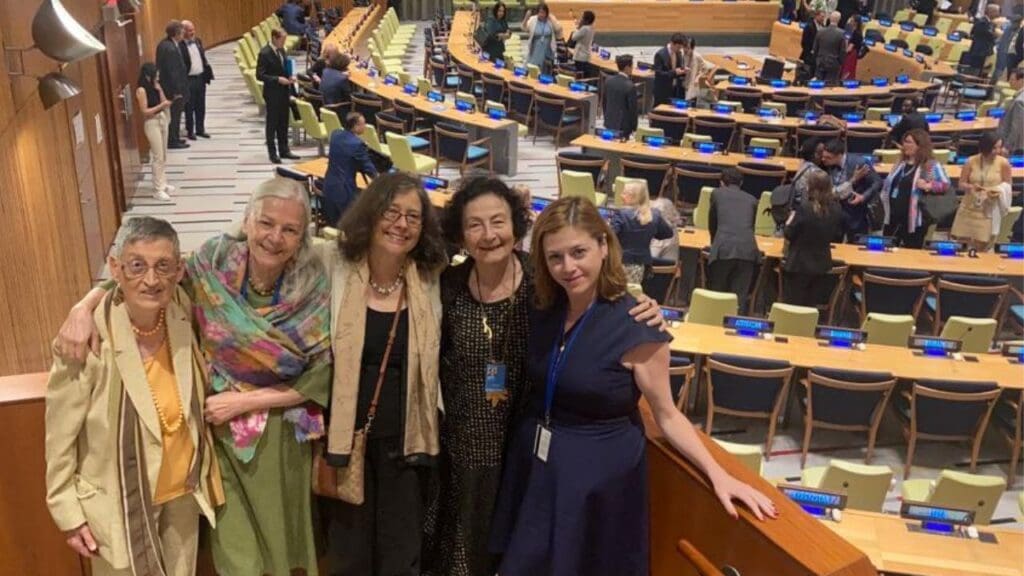
Today, July 17, 2023, marks the 25th anniversary of the Rome Statute, the foundational treaty of the International Criminal Court (ICC). The negotiations that culminated in Rome gave the world the first and only permanent international institution capable of providing accountability for the most heinous crimes that must shock the conscience of all global citizens: genocide, crimes against humanity, war crimes, and the Crime of Aggression.
CGS played an integral role in the Court’s nascence through its leadership within the Coalition for the International Criminal Court (CICC) founded by CGS National Advisory Council member Bill Pace. The Court animates and gives meaning to CGS founding member Ben Ferencz’s vision of a world governed by law, not war.
A quarter of a century later, as we contemplate this landmark in international criminal justice, our work continues. CGS calls for redoubled efforts to enhance the ICC’s universality and effectiveness, most notably including ratification of the Rome Statute by the United States, one of a minority of States that have not accepted the Court’s jurisdiction.
The US, which was represented at Rome by CGS NAC Member and first US Ambassador-at-Large for War Crimes Issues David Scheffer, was a critical player in shaping the Statute. The US’s rich domestic legal tradition is reflected across the treaty and the ICC’s rules of evidence and procedure, and reverberates throughout the Court’s jurisprudence. Further, the US played a critical role in bringing before the ICC two of the first defendants to be found guilty of atrocity crimes, without which their victims may never have found justice. CGS stands with all who call on the United States to rectify this glaring omission by ratifying the Rome Statute. As the “Court of last resort,” the ICC only has jurisdiction in instances where there are no viable domestic pathways for justice. Lack of confidence in the Court therefore connotes concern about deficiencies within domestic legal frameworks.
CGS also encourages ongoing US support in the forms of cooperation and resourcing for the Trust Fund for Victims, inter alia, as advocated by Amb. Scheffer and others, including CGS NAC member Leila Sadat, Special Adviser to the ICC on Crimes Against Humanity, who bravely stood against attacks on the Court under the previous US administration.
Beyond that watershed moment for international justice achieved in Rome in 1998, the Statute has stood the test of time; the ICC has never been busier. In addition to achieving tangible results in cases directly contemplated by the Court, the Rome Statute has profoundly influenced domestic legislation governing the crimes under its jurisdiction, notably impacted on how gender-based and sexual violence are treated as international crimes, and advanced new ways for victims and survivors to participate in legal proceedings, to mention just a few of its contributions.
However, the treaty and the Court’s functioning still must be strengthened and necessary reforms implemented. Criticisms of the ICC, with its unique and daunting mandate, should be viewed as opportunities for improvements to its efficiency and effectiveness. These include closing jurisdictional gaps and achieving not only universal ratification of the foundational statute but its amendments, including the “Kampala Amendments” on the Crime of Aggression and certain war crimes, and more recently proposed amendments by States Parties to criminalize certain categories of weapons (Belgium), classify forcible starvation as a crime (Switzerland), and render ecocide as an independent crime beyond its interpretation elsewhere in the Statute.
As Citizens for Global Solutions, we believe in acting together to strengthen the rule of law and achieve a world where impunity cannot be tolerated; where victims and survivors and the global community as a whole can be assured of justice for the gravest crimes. The ICC must be a part of this future and we look forward to continuing to support the Court as an essential organ of a democratic world federation in the quarter century to come and beyond.

Rebecca A. Shoot is the Executive Director of Citizens for Global Solutions and Co-Convener of the Washington Working Group for the ICC, an informal, nonpartisan, and diverse coalition of nongovernmental organizations, legal professionals, and advocates that promotes US engagement and cooperation with the ICC.
Citizens for Global Solutions (CGS) is a non-governmental, non-profit, non-partisan membership-based organization that for more than 75 years has brought together a diverse collective of individuals and organizations with a common goal of a unified world predicated upon peace, human rights, and the rule of law. From championing ratification of the UN Charter upon our establishment in 1947 to supporting creation of the International Criminal Court (ICC) 25 years ago to advocating for global instruments to confront today’s enduring challenges of war and climate degradation, CGS recognizes that true progress is a generational enterprise. We invite like-minded individuals and organizations to join us in this mission.
Contact: outreach@globalsolutions.org


























